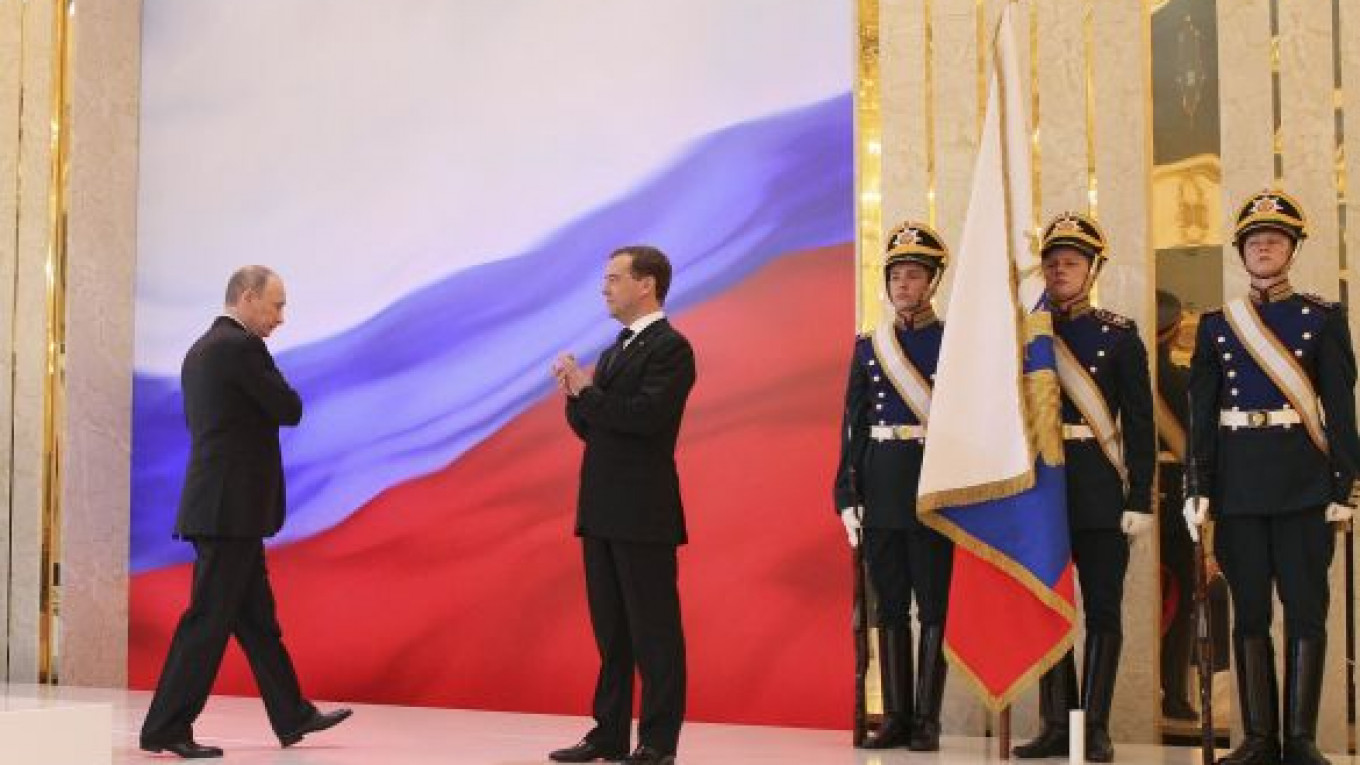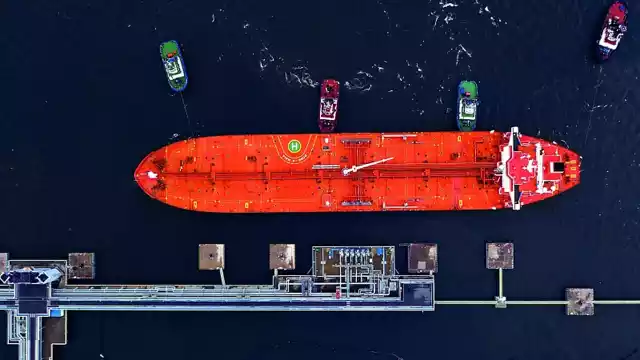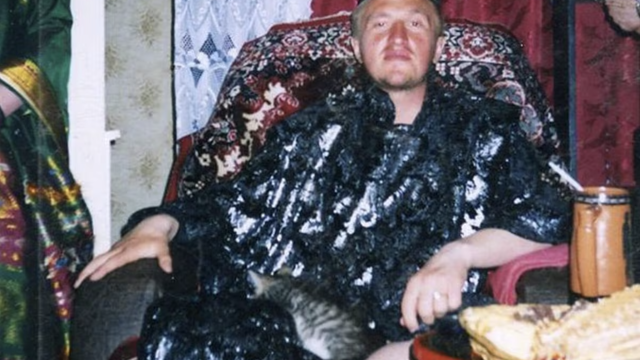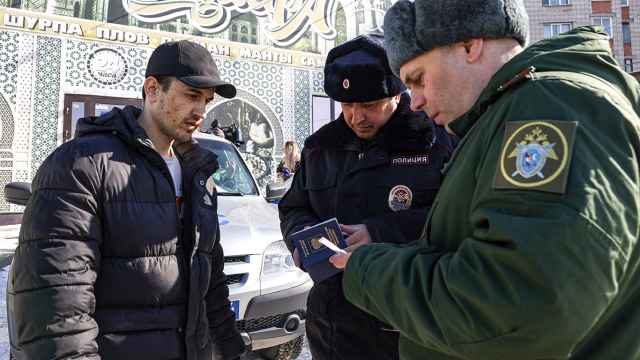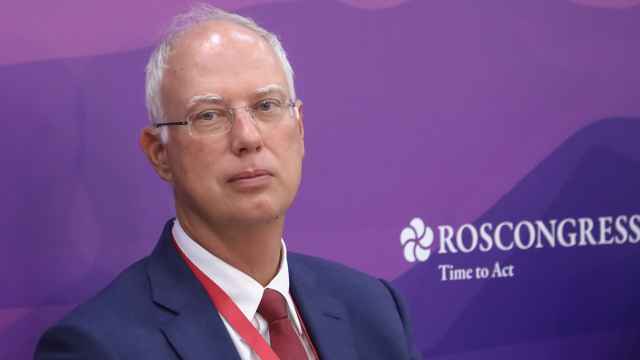Vladimir Putin took the presidential oath of office in a ceremony Monday, while some of the guests were aware of the brutal standoff the previous evening between riot police and anti-government protesters.
"I stayed away from the news flow yesterday," a man in his late 20s or early 30s said to a companion as they walked to the Grand Kremlin Palace after clearing the security at the Kutafya Tower. "How was it?"
The other man replied, "It was carnage."
The topic was on the tip of the tongue of another suited pair of guests that followed closely.
"They used gasoline bombs," said the guest.
"There was just one," the other disagreed.
Police detained more than 400 protesters Sunday at the rally of tens of thousands that became violent at its close. It was one of the demonstrations that stemmed from what observers described as fraudulent State Duma elections in December and gradually morphed into anti-Putin events.
But there was no shortage of Putin admirers on hand for the inauguration at the Grand Kremlin Palace.
A Cossack chief, wearing standard military uniform but with Cossack insignia, watched the broadcast of Putin leaving the Cabinet building at about 11:40 a.m. for the Kremlin.
As Putin shook hands with the aid-de-camp, who opened the door of the limousine, the Cossack reminisced about his own handshakes with the man who was returning to the presidency.
"I shook hands with him eight times," he said respectfully to a fellow decorated officer. "He would never pass by. He would look you right in the eyes."
Arriving at the inauguration palace, Putin didn't wait for the aid-de-camp to open the car door, unlike outgoing President Dmitry Medvedev, who was chauffeured in separately earlier.
Putin took the oath for his third term as president after a four-year stint as prime minister in between.
The audience of 3,000 people stood in two chambers for the brief ceremony that took about 20 minutes.
Government officials, including lawmakers, governors and Cabinet members, filled the glittering Andreyevsky Hall, where Putin took the oath. The more modest Georgiyevsky Hall around the corner housed the other dignitaries, such as Soviet President Mikhail Gorbachev, military top brass and the country's wealthiest business people.
The non-government crowd, which included Alfa Group co-owner Mikhail Fridman and LUKoil chief Vagit Alekperov, only got a glimpse of Putin in the flesh when he walked in and out on the red carpet in the middle of the hall where they watched the ceremony on closed circuit television.
The solemn ceremony and the broadcast of the Putin motorcade making the trip to the Kremlin in the city center — which would normally be bustling but was deserted due to tight security — made a strong impression on some of the guests.
"You look at this and realize how great a power Russia is," the Cossack chief exclaimed in a low voice.
After the ceremony, boxing heavyweight-turned-lawmaker Nikolai Valuyev quickly won the spotlight as the crowd began to dissolve. Many ladies and some gentlemen were eager to pose for a photo with the famed owner of the menacing face and enormous physique.
Number two in this unannounced celebrity contest was the businessman-cum-rising-political-star Mikhail Prokhorov, rich and also tall. Between photographs, he chatted with former Finance Minister Alexei Kudrin and Kremlin economic aide Arkady Dvorkovich.
Unlike the Cossack officer, rector of the government's Economics Academy Vladimir Mau wasn't willing to let out any strong emotions as he left the Kremlin.
Asked if the ceremony made him feel proud of Russia, he said he had been proud of the country since elementary school.
To the question of how the inauguration made him feel, he sounded entirely unmoved.
"That time goes by," he replied.
A Message from The Moscow Times:
Dear readers,
We are facing unprecedented challenges. Russia's Prosecutor General's Office has designated The Moscow Times as an "undesirable" organization, criminalizing our work and putting our staff at risk of prosecution. This follows our earlier unjust labeling as a "foreign agent."
These actions are direct attempts to silence independent journalism in Russia. The authorities claim our work "discredits the decisions of the Russian leadership." We see things differently: we strive to provide accurate, unbiased reporting on Russia.
We, the journalists of The Moscow Times, refuse to be silenced. But to continue our work, we need your help.
Your support, no matter how small, makes a world of difference. If you can, please support us monthly starting from just $2. It's quick to set up, and every contribution makes a significant impact.
By supporting The Moscow Times, you're defending open, independent journalism in the face of repression. Thank you for standing with us.
Remind me later.


